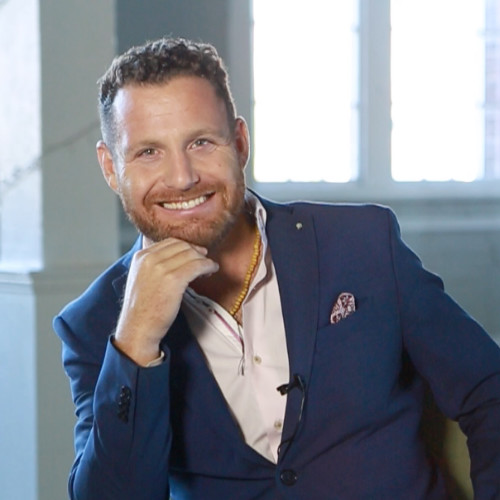For many fractional executives, the transition from technical expert to business owner brings an unexpected challenge: the need to sell. After years of focusing on delivering excellence in your field, suddenly you're faced with the daunting task of marketing yourself and closing deals.
If this feels uncomfortable, you're not alone. In a recent conversation with Christopher Filipiak, sales consultant and coach for CEOs, we explored how fractional executives can transform their relationship with sales to build a sustainable practice.
The Engineer's Approach to Sales
Christopher brings a unique perspective to sales, having started his career as an industrial engineer at Ford Motor Company before transitioning to business development. This engineering background shapes his approach to sales as a system of systems, a process that can be optimized by removing waste and focusing on cause-and-effect relationships.
"What a lot of people do is pick strategies based on what's comfortable for them and not based on cause and effect," Christopher explains. "They're like fear-driven strategies because they're thinking, 'I don't like to do that' or 'That scares me' or 'That makes me uncomfortable.'"
Instead, he recommends selecting strategies based on what will most efficiently lead to your desired outcome, then doing the inner work to overcome whatever resistance arises.
The Mindset Shift: Sales as an Act of Love
For fractional executives who cringe at the thought of selling, Christopher offers a powerful reframe: "Sales is an expression of love, sales is an act of love. It's not something you do to other people, but something you do for other people."
This shift from seeing sales as taking (getting clients, securing money) to giving (providing solutions, creating value) transforms not just how you feel about sales, but how you show up in sales conversations.
"When I show up in a sales conversation, I show up with the energy that I'm here to give my clients money, because I help CEOs add revenue to their business. I'm not actually here to get anything from other people," Christopher says.
This mindset change requires replacing old beliefs with new thoughts:
- "Sales is something I do for people"
- "Sales is an act of service"
- "I am lovable, I am good enough, I am worthy"
As these new beliefs take root, you naturally show up differently in sales conversations. Instead of approaching prospects from a place of neediness or scarcity, you operate from abundance, confident in the value you provide and genuinely focused on how you can help.
Finding Your "Give" in Every Offer
Every fractional service solves a problem, bridging the gap between where your clients are and where they want to go. When you focus on this gap and how your expertise fills it, sales transforms from an awkward ask to a natural offering.
Christopher used the analogy of Paul Walker's character in Fast and Furious, who needed a "10-second car" to beat Vin Diesel in a race: "The mechanic's like, 'Well, you need nitrous oxide, right? You need NOS.' It's like Paul Walker had a problem. We all have problems. There's always a gap between where we are and where we want to go."
As a fractional executive, your job is to understand what people want and connect them with the solution that gets them there; whether it's streamlining operations, implementing new technology, or developing a more effective marketing strategy.
Practical Sales Activities for Time-Strapped Executives
Most fractional executives have limited time for business development, perhaps 5-7 hours weekly alongside client work. Christopher recommends consistency over volume, suggesting these key activities:
- Daily outreach: Even a small amount of consistent outreach creates momentum over time
- Monthly events: Host regular gatherings (virtual or in-person) where potential clients can experience your expertise
- Content creation: Share insights on LinkedIn where your ideal clients already spend time
- Relationship nurturing: Systematically stay in touch with your network and past prospects
- Podcast guesting: Leverage other people's audiences to expand your reach
"I'd much rather see you do 30 minutes every day than eight hours on a Friday," Christopher advises. "That consistency really matters."
The Human Approach to LinkedIn Outreach
With everyone's inboxes flooded with automated messages, how can fractional executives stand out? Christopher recommends directness and honesty:
"I just try to be direct and honest about what I'm doing. I'll say something like, 'Hey, your work inspired me to reach out and connect.' I keep it you-centric. 'I'd love to connect with you and see if it makes sense to start a conversation.'"
This approach combines several key elements:
- Focusing on the recipient, not yourself
- Being transparent about your intentions
- Avoiding manipulative tactics or false pretenses
Christopher notes that mature business owners are generally receptive to someone reaching out to offer help because "we're in the business of growing, and you know that you need help to do that."
For effective LinkedIn outreach, he recommends focusing on four components:
- Targeted list: Reaching out to the right people
- Clear message: Being direct and honest
- Optimized profile: Ensuring your profile clearly communicates your value
- Content engagement: Interacting with prospects' content
Handling Rejection: A Necessary Part of the Process
The fear of rejection prevents many fractional executives from consistent outreach. But as Christopher points out, rejection is simply part of finding your ideal clients:
"You're going to reach out to people and they're not going to like it. You're going to reach out to people and a lot of them aren't going to want or need what you have. That doesn't mean you're not; you're searching for your people, the people who you can help, who can fully value what you bring to the table. And everyone else is just not your people, and that's okay."
When someone responds negatively to your outreach, "it has nothing to do with you. You're here to help people and show up in service."
The Five Daily Habits for Success
Beyond specific sales tactics, Christopher shared five daily habits that create a foundation for sustainable growth:
- Sales: Develop a habit of making sales activities as routine as making coffee or checking your phone
- Clarity: Maintain clarity on what you want to achieve
- Feeling your feelings: Learn to process emotions and triggers rather than letting them dictate your actions
- Calendar discipline: Use your calendar intentionally and keep your word to yourself
- Cause-and-effect thinking: Focus on the specific actions that directly lead to your desired outcomes
"If you want bigger biceps, the cause of that is curls, right? It's not working on your website or drinking a smoothie," Christopher explains. This clarity about what actually drives results eliminates wasted effort and accelerates progress.
Putting It All Together: Your Action Plan
For fractional executives looking to transform their relationship with sales, consider these steps:
- Reframe how you think about sales: Write down three ways your service genuinely helps clients and review this before any sales activity
- Commit to daily consistency: Block 30 minutes daily for outreach and relationship nurturing
- Develop direct, honest outreach messages: Create templates that focus on the recipient and clearly state your intentions
- Build a system for handling rejection: Create a ritual for processing "no" responses without taking them personally
- Track cause-and-effect relationships: Document which activities consistently lead to conversations and clients
Remember that sales effectiveness grows with practice. Every conversation, whether it leads to business or not, builds your confidence and refines your approach.
By approaching sales as an act of service, something you do for others, not to them, you transform what many find uncomfortable into a natural extension of your expertise. Your technical skills solve problems; your sales efforts simply connect those solutions with the people who need them most.
Mylance
This value-added article was written by Mylance. Mylance takes your marketing completely off your hands. We build the marketing machine that your Fractional Business needs, but you don't have time to run. So it operates daily, growing your brand, completely done for you.Instead of dangling numbers in front of you, our approach focuses on precise and thoughtful input: targeted outreach to the right decision makers, compelling messaging that resonates, and content creation that establishes trust and legitimacy.To apply for access, submit an application and we'll evaluate your fit for the service. If you’re not ready for lead generation, we also have a free, vetted community for top fractional talent that includes workshops, a rates database, networking, and a lot of free resources to support your fractional business.

Written by:
From Uber to Fractional COO to Mylance founder, I've run my own $25k / mo consulting business, and now put my business development strategy into a service that takes it all off your plate, and powers your business





